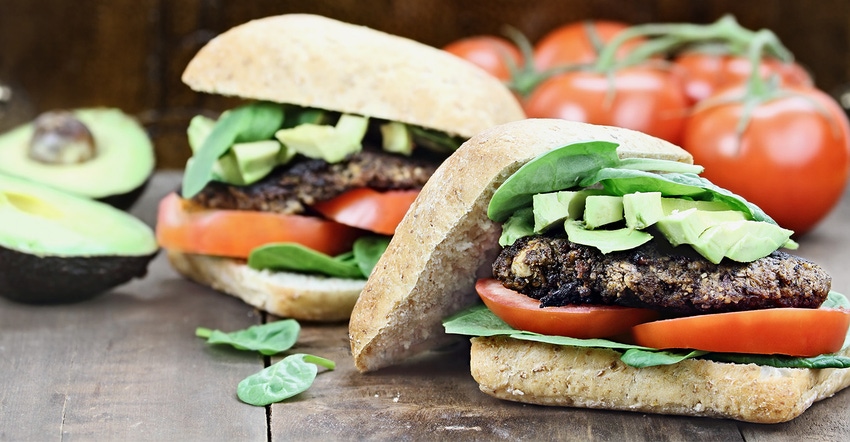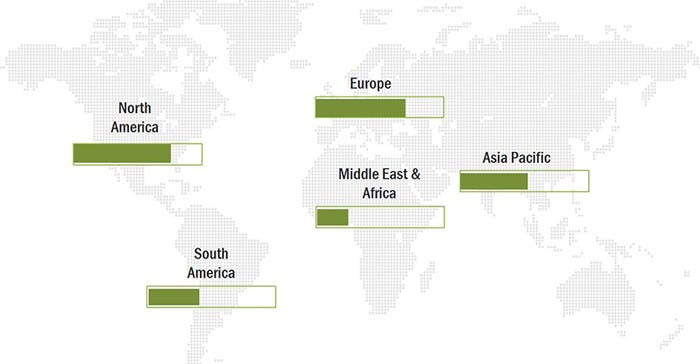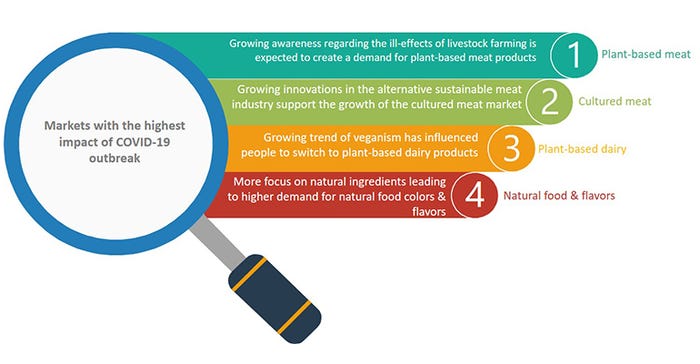The shift of consumers toward meat alternatives has been further fueled by the outbreak of COVID-19 this year.

The global food industry is facing enormous transformation, led by dynamics in the various subsectors and consumer demand. Consumers bring innovation to the food industry due to their changing dietary preferences among food products and ingredients. Livestock meat and meat products is one such industry of the food sector which is impacted greatly due to this transition.
A meatless revolution has started in some major food markets in the North American and European regions, with novel and disruptive innovations impacting the traditional meat sector. From plant-based to insect protein to cultured meat, the alternative protein options available in the market have rattled the meat industry. With increased media attention and the growing focus of industry players toward exploring sustainable and environmentally friendly alternatives to traditional meat, a shift in consumer trends toward the consumption of meat alternatives has been observed. This shift of consumers toward meat alternatives has been further fueled by the outbreak of COVID-19 this year.
Coronavirus, the most talked-about threat these days, is expected to affect a significant number of industries in one or the other way. For instance, it is expected to negatively affect the growth of the traditional meat industry, while having a positive impact on the growth of meat substitutes in the upcoming years. There is no evidence that food acts as the vector for disease spread, but it is widely known that the disease began through animal meat and then transferred to humans in Wuhan, China. Although livestock meat is not the cause of disease spread, the overabundance of caution due to social media influence and false rumors associated with the consumption of meat and meat products may push consumers to opt for alternative options such as plant-based meat and cultured meat, which are presumed to be more hygienic options.
Figure 1: Developed regions are expected to show a higher inclination towards meat substitutes.

Growth and market size for meat substitutes market as per MNM analysis; Source: Secondary Research, Primary Interviews, Related Research Publications, Industry Journals, Press Releases, Magazines, Company Publications, MarketsandMarkets Analysis.
Trade in the traditional meat industry is expected to be affected by this outbreak due to the shallowing demand for livestock meat products in major meat-importing countries, such as the U.S., China, Japan and Germany, which, in turn, would hit the sector’s economy of meat-exporting countries. For instance, according to New Zealand government statistics, meat export to China from New Zealand has dropped about 40% through February of this year as compared to 2019. Moreover, Australia is one of the largest exporters of beef to China. It exported around 24% of the exported beef to China in 2019. However, the outbreak is expected to result in a severe drop in consumer demand in China and corresponding exports. Regions such as North America and Europe will experience a great demand for plant-based meat. Also, developments related to cultured meat products are expected to gain significance due to accelerated demand for products from consumers wherein the acceptability of meat substitutes is comparatively low, such as Asia Pacific, the Middle East, and Africa.

Source: Secondary Research, Primary Interviews, Related Research Publications, Industry Journals, Press Releases, Magazines, Company Publications, MarketsandMarkets Analysis.
The impact of COVID-19 is not only expected to positively affect the plant-based meat market but also show its impact on related industries, such as plant-based dairy, plant-based protein and cultured meat. The growing trend of GMO-free and clean eating with sustainable processing may create the demand for natural and plant-based food products and ingredients. The COVID-19 outbreak has already pushed the related government agencies to monitor food safety closely and promote healthy eating, which, in turn, will affect the food processing of sustainable and plant-based products. More focus may also be laid towards disinfection and hygiene practices in production plants and in different stages of food supply chain. Although the price of plant-based meat products is higher than traditional meat, plant-based industry players, such as Impossible Foods, have announced a price cut of around 15% for U.S. distributors. It can be observed that the outbreak of COVID-19 will bring positive growth in demand for plant-based and natural products but can negatively affect the demand for traditional meat in the food sector.
Amarnath Rajendran has 10+ years of overall experience in competitive analysis, market research, strategic consulting, and client engagement. Experienced in industries across, BFSI, Chemicals & Materials, FMCG, Food & Beverages and has a good understanding of business ecosystem, culture, and industry-specific challenges.
Mahima Solanki is a research analyst with over 3 years of experience in the area of consulting, market research and strategy planning. Over the period, she has worked for varied and connected domains such as food & beverage domain. She has been responsible for providing strategic solutions to clients through market estimations, forecasting, data analysis, and competitive intelligence.
About the Author(s)
You May Also Like








